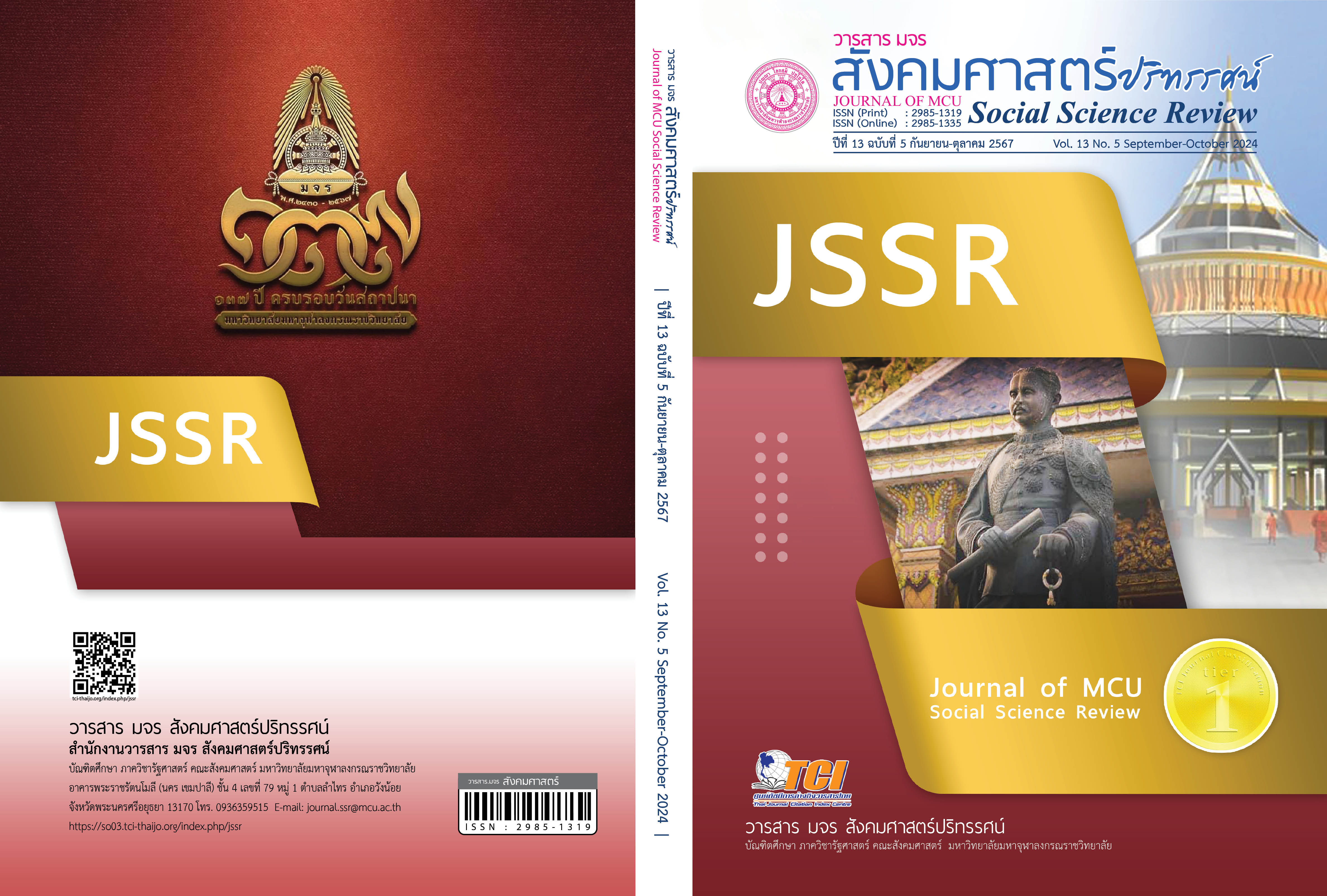การบูรณาการหลักพุทธธรรมาภิบาลเพื่อส่งเสริมประสิทธิผลการบริหารงาน ของมหาวิทยาลัยมหาจุฬาลงกรณราชวิทยาลัย ในวิทยาเขตภาคเหนือตอนบน
คำสำคัญ:
การบูรณาการ, พุทธธรรมาภิบาล, ประสิทธิผลการบริหารงานบทคัดย่อ
บทความวิจัยนี้มีวัตถุประสงค์ 1. ศึกษาประสิทธิผลของการบริหารจัดการของมหาวิทยาลัยมหาจุฬาลงกรณราชวิทยาลัย ในวิทยาเขตภาคเหนือตอนบน 2. ศึกษาปัจจัยที่ส่งผลต่อประสิทธิผลของการบริหารจัดการของมหาวิทยาลัยมหาจุฬาลงกรณราชวิทยาลัย ในวิทยาเขตภาคเหนือตอนบน และ 3. นำเสนอการบูรณาการหลักพุทธธรรมาภิบาลเพื่อส่งเสริมประสิทธิผลการบริหารงานของมหาวิทยาลัยมหาจุฬาลงกรณราชวิทยาลัย ในวิทยาเขตภาคเหนือตอนบน เป็นวิจัยแบบผสานวิธี คือ การวิจัยเชิงปริมาณ ใช้แบบสอบถามที่ได้ค่าความเชื่อมั่นเท่ากับ 0.801 เป็นเครื่องมือในการเก็บข้อมูลกับกลุ่มตัวอย่าง จำนวน 177 รูปหรือคน โดยสุ่มจากประชากรทั้งหมด 315 รูปหรือคน จากสูตรของทาโร่ ยามาเน่ (Taro Yamane) ซึ่งทำการสุ่มตัวอย่างแบบแบ่งชั้นภูมิและการสุ่มตัวอย่างแบบง่าย วิเคราะห์ข้อมูลโดยใช้ค่าความถี่ ค่าร้อยละ ค่าเฉลี่ย ส่วนเบี่ยงเบนมาตรฐาน การวิเคราะห์สหสัมพันธ์และการวิเคราะห์การถดถอยพหุคูณ และการวิจัยเชิงคุณภาพ ได้ใช้วิธีการสัมภาษณ์เชิงลึกกับผู้ให้ข้อมูลสำคัญ และการสนทนากลุ่มเฉพาะ ซึ่งเป็นกลุ่มนักวิชาการด้านพระพุทธศาสนา ด้านรัฐประศาสนศาสตร์ ผู้บริหาร ผู้ปฏิบัติงาน และกลุ่มผู้รับบริการ รวมจำนวน 27 รูปหรือคน จากนั้นวิเคราะห์ข้อมูลโดยการวิเคราะห์เนื้อหาและสรุปผลการศึกษาด้วยเทคนิคเชิงพรรณนา
ผลการวิจัยพบว่า 1. ประสิทธิผลของการบริหารจัดการของมหาวิทยาลัยมหาจุฬาลงกรณราชวิทยาลัย ในวิทยาเขตภาคเหนือตอนบน โดยภาพรวมอยู่ในระดับมาก 2. ปัจจัยที่ส่งผลต่อประสิทธิผลของการบริหารจัดการของมหาวิทยาลัยมหาจุฬาลงกรณราชวิทยาลัยในวิทยาเขตภาคเหนือตอนบน ได้แก่ 1. การปฏิบัติงานตามหลัก 7S 1 ด้าน อย่างมีนัยสำคัญทางสถิติที่ระดับ .01 จึงยอมรับสมมติฐานการวิจัย 2. หลักพละ 4 3 ด้าน อย่างมีนัยสำคัญทางสถิติที่ระดับ .01 และ .05 จึงยอมรับสมมติฐานการวิจัย 3. รูปแบบพุทธบูรณาการหลักพุทธธรรมาภิบาลเพื่อส่งเสริมประสิทธิผลการบริหารงานของมหาวิทยาลัยมหาจุฬาลงกรณ
ราชวิทยาลัย วิทยาเขตภาคเหนือตอนบน โดยบูรณาการหลักพุทธธรรมาภิบาล (พละ 4) พร้อมทั้งนำเทคโนโลยีและนวัตกรรมมาใช้ เพื่อเพิ่มประสิทธิภาพการทำงานอย่างโปร่งใส ยึดหลักจริยธรรม และใช้โมเดล 7S เพื่อปรับปรุงการบริหารงานให้มีประสิทธิภาพสูงสุด
เอกสารอ้างอิง
คณิตดา กรรณสูต. (2565). พุทธวิธีการบริหารจัดการองค์กรคุณภาพของบริษัทมหาชนจำกัด (ดุษฎีนิพนธ์ปรัชญาดุษฎีบัณฑิต สาขาวิชารัฐประศาสนศาสตร์). พระนครศรีอยุธยา: มหาวิทยาลัยมหาจุฬาลงกรณราชวิทยาลัย.
ชรินทร์ มั่งคั่ง. (2559). ภาวะผู้นำคุณภาพการศึกษาสู่มาตรฐานการเรียนรู้สังคมศึกษา. เชียงใหม่: โรงพิมพ์ไดมอนด์ กราฟิก กรุ๊ป.
ถวิลวดี บุรีกุล. (2561). หลักธรรมาภิบาลจากแนวคิดสู่การปฏิบัติในสังคมไทย. กรุงเทพฯ: สถาบันพระปกเกล้า.
ทิวากร แก้วมณี. (2559). ธรรมาภิบาล. กรุงเทพฯ: สำนักพิมพ์สยามปริทัศน์.
ธงชัย คล้ายแสง. (2562). หลักธรรมาภิบาลกับการบริหารจัดการภาครัฐแนวใหม่. วารสารวิจัยวิชาการ, 2(2) : 177-188.
พระพรหมบัณฑิต (ประยูร ธมฺมจิตฺโต). (2557). ชูหลักพุทธบูรณาการพัฒนาจิตใจ-สังคม. สืบค้น 25 กันยายน 2566, จาก https://www.mcu.ac.th/news/detail/11029
พระมหาปรีชา เขมนนฺโท. (2561). การประยุกตหลักอิทธิบาทธรรมเพื่อการบริหารจัดการ สำนักปฏิบัติธรรมในจังหวัดพระนครศรีอยุธยา (ดุษฎีนิพนธ์พุทธศาสตรดุษฎีบัณฑิต สาขาวิชาการจัดการเชิงพุทธ). พระนครศรีอยุธยา: มหาวิทยาลัยมหาจุฬาลงกรณราชวิทยาลัย.
พระมหาวิเศษ กนฺตธมฺโม. (2564). พุทธบูรณาการเพื่อการพัฒนาประสิทธิผลการบริหารงานของ เทศบาลเมืองในจังหวัดชลบุรี (ดุษฎีนิพนธ์ปรัชญาดุษฎีบัณฑิต สาขาวิชารัฐประศาสนศาสตร์). พระนครศรีอยุธยา: มหาวิทยาลัยมหาจุฬาลงกรณราชวิทยาลัย.
สร้อยตระกูล ติวยานนท์ อรรถมานะ. (2545). พฤติกรรมองค์กร : ทฤษฎีและการประยุกต์.กรุงเทพฯ: โรงพิมพ์มหาวิทยาลัยธรรมศาสตร์.
สุเมธ แสงนิ่มนวล. (2552). ภาวะผู้นำกับธรรมาภิบาลในการบริหารงานองค์กรปกครองส่วน ท้องถิ่น. กรุงเทพฯ: ส.เจริญการพิมพ์.
สุรพล สุยะพรหม และสุทธิรัก ศรีจันทร์เพ็ญ. (2553). ระเบียบวิธีวิจัยทางการจัดการ. กรุงเทพฯ: มหาวิทยาลัยมหาจุฬาลงกรณราชวิทยาลัย.
ดาวน์โหลด
เผยแพร่แล้ว
รูปแบบการอ้างอิง
ฉบับ
ประเภทบทความ
สัญญาอนุญาต
ลิขสิทธิ์ (c) 2024 วารสาร มจร สังคมศาสตร์ปริทรรศน์

อนุญาตภายใต้เงื่อนไข Creative Commons Attribution-NonCommercial-NoDerivatives 4.0 International License.
เพื่อให้เป็นไปตามกฎหมายลิขสิทธิ์ ผู้นิพนธ์ทุกท่านต้องลงลายมือชื่อในแบบฟอร์มใบมอบลิขสิทธิ์บทความให้แก่วารสารฯ พร้อมกับบทความต้นฉบับที่ได้แก้ไขครั้งสุดท้าย นอกจากนี้ ผู้นิพนธ์ทุกท่านต้องยืนยันว่าบทความต้นฉบับที่ส่งมาตีพิมพ์นั้น ได้ส่งมาตีพิมพ์เฉพาะในวารสาร มจร สังคมศาสตร์ปริทรรศน์ เพียงแห่งเดียวเท่านั้น หากมีการใช้ภาพหรือตารางหรือเนื้อหาอื่นๆ ของผู้นิพนธ์อื่นที่ปรากฏในสิ่งตีพิมพ์อื่นมาแล้ว ผู้นิพนธ์ต้องขออนุญาตเจ้าของลิขสิทธิ์ก่อน พร้อมทั้งแสดงหนังสือที่ได้รับการยินยอมต่อบรรณาธิการ ก่อนที่บทความจะได้รับการตีพิมพ์ หากไม่เป็นไปตามข้อกำหนดเบื้องต้น ทางวารสารจะถอดบทความของท่านออกโดยไม่มีข้อยกเว้นใดๆ ทั้งสิ้น





